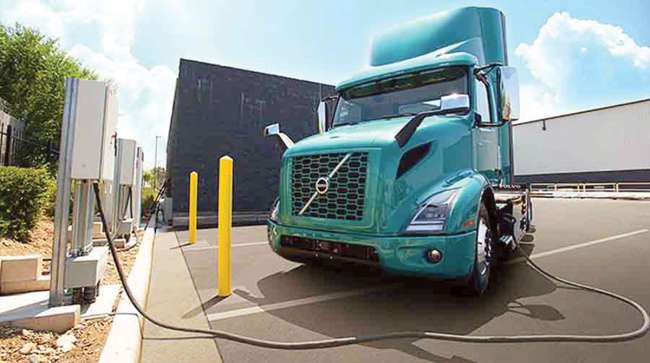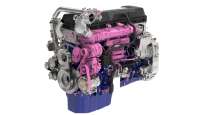Senior Reporter
CARB Rules Seen as Hindrance to Obtaining New Diesel Vehicles

[Stay on top of transportation news: Get TTNews in your inbox.]
The sale of zero-emission vehicles in California over the past two years has been better than anticipated, but the regulatory emphasis on transitioning fleets from diesel to electric has left some of the state’s large truck dealers with an inability to obtain new diesel trucks to sell to carriers.
“Both the Advanced Clean Trucks and low NOx Omnibus regulations are severely limiting the availability of new trucks in California and California opt-in states,” Mike Tunnell, California-based senior director of environmental affairs/research for American Trucking Associations, told the California Air Resources Board at a recent hearing.
“As noted in CARB Executive Officer Steven Cliff’s recent memo to the board," he said, "the ACT requirements are being pushed onto the dealerships and fleets. Internal combustion engine sales fleets are experiencing restrictions on the availability of new ICE trucks. And, when they are able to purchase them, these trucks come at a significant price premium.
“ATA fleet members rely on the purchase of new trucks to move our nation’s freight. New trucks deliver emission reductions and deploy the newest safety technologies available.”

Tunnell
“Overall, the product shortage for the 2024 model year affects heavy-duty diesel vehicles, but especially the medium heavy-duty,” Cliff told CARB board members. “It is not driven by the Advanced Clean Trucks regulation, and is in fact mostly driven by a limited supply of compliant heavy-duty Omnibus diesel engines.”
Kat Talamantez from CARB’s Mobile Source Control Division said the ACT regulation establishes requirements for medium- and heavy-duty manufacturers to sell an increasing portion of zero-emission vehicles starting in the 2024 model year, and ramping up through 2025. It provides credit for early sales, flexibility to make up a deficit within one model year, and the ability for manufacturers to bank and trade credits, she added.
Talamantez said that based on information reported to CARB in 2021 and 2022, manufacturers are currently two years ahead of compliance of the regulation, and have already produced enough zero-emission vehicles to meet the 2024 and 2025 requirements.
Host Seth Clevenger and Features Coordinator Mike Senatore take you behind the scenes to unveil the 2024 Top 50 Global Freight Companies. Tune in above or by going to RoadSigns.ttnews.com.
“The data for the 2023 model year shows that ZEVs make up about 16% of the total new medium- and heavy-duty vehicle sales in California,” Talamantez said. “Ten other states so far have adopted ACT, cumulatively accounting for about 25% of medium- and heavy-duty truck sales in the U.S.
“CARB staff has met with over 40 stakeholders, including representatives from all major truck and engine manufacturers, fleets and dealers. The situation is evidently complicated with several contributing factors. However, all manufacturers have explicitly indicated that the product availability issues for the 2024 model year are not caused by the ACT regulation.”
But several truck dealership executives told CARB they are convinced the ACT regulation is responsible for the truck sales drought.
How bad is the ICE trucks scarcity in California?

Shimoda
Chris Shimoda, senior vice president for government affairs at California Trucking Association, told CARB that for the past year his association has received reports that 60% to 90% in normal truck allocations and product lines have been outright discontinued in California.
“From one dealer: This year we had 2,800 sales but only 800 trucks. Next year we will have 39. From another dealer: Last year, the yard was full of hundreds of trucks, but today the yard is nearly empty. From yet another: Our salesmen are realizing trucking might not recover and we will need to find different job opportunities to make ends meet.”
Said Anthony Bento, chief legal officer at the California New Car Dealers Association, which represents truck dealers throughout the state: “Sales data that we provided to the board demonstrates that the magnitude of these declines is significant, over 80% for Class 8 vehicles, and the scale of these declines is unique to California and cannot just be attributed to national or economic factors.
“If the supply of these trucks is not increased in California, businesses that rely on these vehicles will be forced with two choices: continue to operate their more polluting vehicles for longer, or purchase vehicles from out of state that do not comply with CARB requirements. Both options undermine our state’s environmental goals and will harm air quality.”

Bento
Said Adam VanderBee, regional sales director for Tech Equipment, a large West Coast distributor for Mack and Volvo commercial trucks: “Having sold out of our 2024 legacy compliant products, we’re now restricted to selling ZEVs or the limited amount of ICE product. The unfortunate reality for us is that neither the demand or production of ZEVs is where we thought it would be at this time.
“We remain in the infancy stages of ZEV rollout in the Class 8 industry for roadblocks such as cost, range, weight and configuration. The reality is at this point even with available grants, a Class 8 ZEV is two to three times the cost of its ICE equivalent.”
Lee Howard, general sales manager at California Truck Centers, said the dealers at eight locations sell Daimler Truck North America brands Freightliner and Western Star in Classes 6-8.
“The dealers are being swallowed alive,” he said. “We normally sell approximately 2,500 trucks a year and employ 760 individuals and have been in business for over 95 years. Our customers have been forced to keep their older polluting trucks.”
Want more news? Listen to today's daily briefing below or go here for more info:





